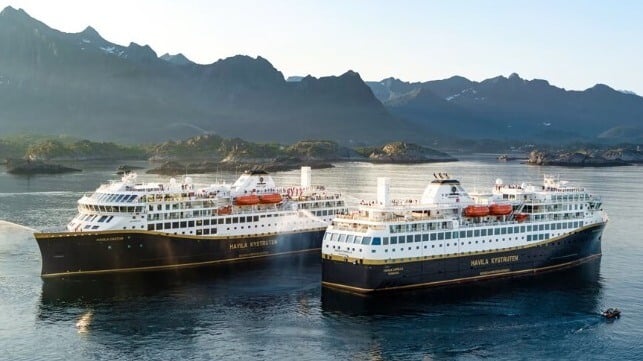Havila Faces Norwegian Fines for Delay in Adding Ship to Coastal Route

Norway’s Ministry of Transport has informed coastal cruise company Havila Kystruten that it intends to fine the company over the delay in starting the operation of its third cruise ship, Havila Polaris, as part of the contract to provide coastal service between Bergen and Kirkenes. The company says the delay is due to its efforts to settle the issues related to freeing its cruise ships from the financial sanctions imposed on Russia in the spring of 2022.
Havila won a 10-year contract from the government in 2018 as one of the two companies along with Hurtigruten to provide transportation along the coast. They were originally scheduled to kick off their service by the beginning of 2021 but received concessions from the government due to construction delays for the ships and the issues related to the disruptions from the pandemic. Havila launched service at the end of 2021 and placed a second cruise ship in service in May 2022 with the Polaris due to start service as the third ship at the beginning of 2023 and a fourth ship later this year.
The company reports that the ministry notified it that it was planning to impose a fine of nearly $752,000 for January 2023 as a consequence of the delayed start of operations for Havila Polaris. Delivery of the ship from the Tersan shipyard in Turkey was delayed in December while Havila worked to finalize arrangements and received orders from the courts in the UK and Ireland that will permit it to acquire the Polaris and settled the financing which originally had been arranged with the Russian company GTLK. Havila recently canceled two scheduled February sailings for the ship saying it was still waiting for a license to be issued from the Irish central bank to complete the transfer of the cruise ship.
The company said it will assess the legality of the liquidated damages based on the fact that it has taken all the steps required to resolve the consequences of sanctions against the company's lender. This is the latest setback for Havila which has been working to overcome the repercussions of the sanctions since April 2022, which forced it to remove its first ship from service for nearly two months.
Havila recently reported that it is experiencing strong demand for the coastal voyages and said it was confident that it was nearing the end of the sanction issues to complete the launch of its four ships. The 15,500 gross ton cruise ships have awards for their advanced designs which include the use of LNG and have the largest battery installation yet completed on a cruise ship.
The company’s first cruise ship, the Havila Capella, entered drydock on February 4 marking its first year with Havila reporting that it would also be making upgrades to enhance its performance. They said the ships have already been successful in reducing emissions on the coastal voyages by 40 percent, significantly more than the 25 percent that was required in the contract with the authorities.
Among the steps they are now taking is the application of a new bottom material. They plan open testing the material to further reduce friction and are expecting a further reduction of at least three percent in energy consumption. They are also looking to the next step which will be mixing biogas with natural gas. Eventually, they expect to convert to 100 percent biogas to fuel the ships.

that matters most
Get the latest maritime news delivered to your inbox daily.
Havila is also seeking to support local ports and encourage the development of more shore power opportunities. The company said it would like to be able to charge the ships’ batteries, especially during longer port stays. They said a charging infrastructure would permit them to reduce fuel consumption by a further 10 percent.
In 2017, Norway opened a new competition for the coastal service saying it would split the route between two companies seeking to increase competition. The government made environmental considerations and improving performance an element of the contract.
